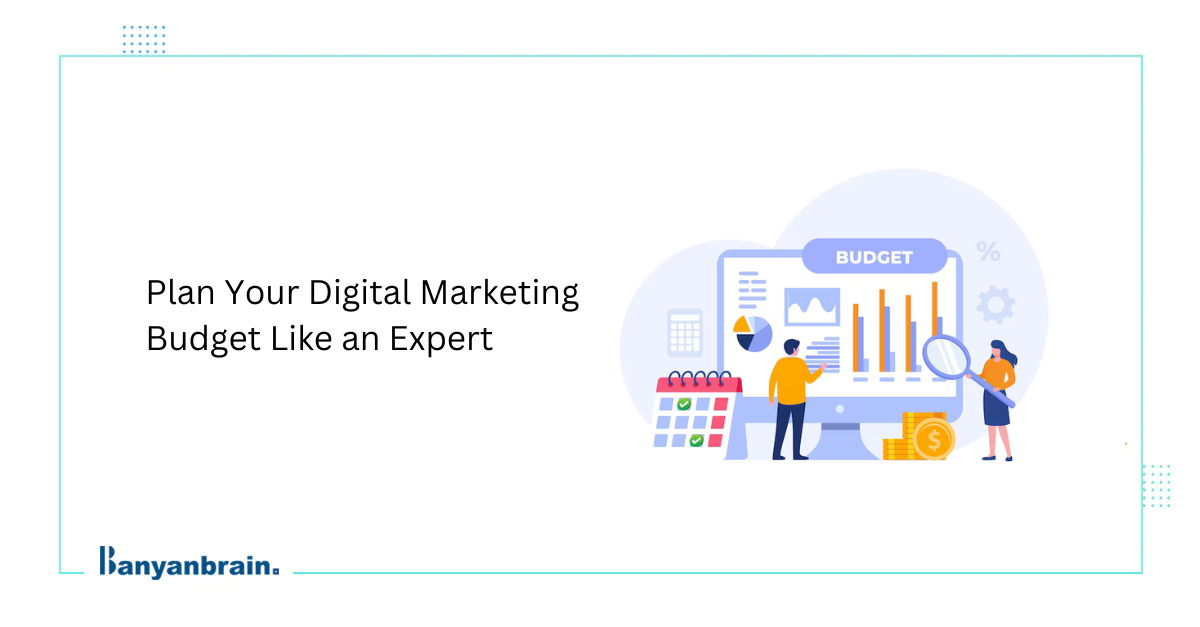Digital marketing has developed into a core component of most business strategies, allowing organizations to communicate with their target audience more effectively than ever before. However, due to the great number of digital marketing options currently available, from budget for online advertising on social media to content marketing and search engine advertising, budgeting is a challenge in itself. Properly allocated money for digital marketing tracks expenses and ensures the distribution of resources according to the most efficient strategies.
As such, this guide will offer a comprehensive approach to creating an effective digital marketing budget. It will also explain the benefits of online marketing, thereby ensuring that all your marketing efforts are fully reciprocated in terms of return on investment (ROI).
Strategies for digital marketing budget allocation
While allocating your digital marketing strategies budget, incorporate the following strategies to ensure you make smart investments.
- Prioritize channels based on performance: Analyze past performance data to identify which channels have yielded the best results. If social media campaigns have proven successful so far in high engagement and traffic through social media, your budget should be allocated toward such channels.
- Define goals: Define specific goals for each marketing channel, such as raising brand awareness, lead generation, or direct sales. Business goals are broad, overarching aims that guide your organization—whether they are increasing sales, enhancing the strength and reputation of a personal brand name, improving customer retention, or expanding market share. These will help you better decide to spend your money, ensuring that the objectives you want to achieve are met.
- Consider the trends: Many businesses observe seasonal highs and lows in demand. During higher customer activity and sales periods, spend more on marketing efforts.
- Test and optimize: Allocate some digital marketing budget to experimentation. Testing new strategies or channels may provide valuable insights into what works best for your audience. Use the data collected to optimize future digital marketing budget allocations based on the experience gained.
- Monitor competitors: Monitor your competitors’ marketing strategies. This could help you understand where they allocate their digital marketing budget, which would give you insights into the industry’s overall trends and help you identify ways to enhance your campaign.
- Balanced short-term and long-term goals: It is crucial to understand the benefits of short and long term digital marketing strategies. While short-term results can be hugely important, never shortchange long-term branding and awareness-building campaigns. This ensures sustained business growth and recognition in the market.
- Understand marketing objectives: Understanding marketing objectives is crucial in planning a digital marketing budget that supports your overall strategy. Marketing objectives are specific, measurable targets tied to broader business goals.
Steps to create a digital marketing budget
Some of the major steps that should be taken before creating a digital marketing budget are mentioned below:
- Calculate budget: After auditing your financial situation, the first step is to calculate the overall marketing budget plan.
- Review past performance: This is an important step because it will give you insight into past marketing efforts that your company has made and worked on. It will also help you learn what mistakes you have made in the past and what you should not repeat.
- Account for the production cost: Try to include or account for all the expenses related to creating the content, designing, and any tools required for the production of your desired content.
- Monitor and adjust the digital marketing budget: When allocating your digital marketing budget plan for clients or any campaign and production, try to monitor and analyze your budget spending. Regularly reviewing and analyzing will help you understand the spending and the campaign results. It will make you flexible for any optimization and changes in current market trends.
Determine your overall digital marketing budget
The first move toward successfully forming a marketing strategy is to outline and create your marketing budget. This process starts with carefully outlining your company’s financial health, including revenue totals and historical expenses. It is common to directly base a portion of total revenue on marketing expenses in practices ranging from 5-10% for established businesses, while a startup or growth phase company will often dedicate 10-20% or more of total revenue towards marketing.
Furthermore, industry benchmarks need to be used so that your digital marketing budget plan can compete and reflect market standards. That is, your budget should find a balance with business goals, especially noting seasonal spikes or dips in spending.
It’s important to have a contingency fund for an unexpected opportunity or challenge that develops in marketing. Regularly review and revise your budget based on performance metrics and market conditions so that it always aligns with your overall business objectives.
Researching and selecting digital marketing channels
- Choosing the right channel: Before making any budgeting or planning decisions, try to choose the right digital marketing platform according to your niche. Choosing the budget for a digital marketing channel can play a significant role because it helps you reach your target audience and achieve your market goals, which can help you stay ahead of your competitors.
- Analyze target audience: It is essential to monitor and analyze your target audience, as well as their behavior and interests. This will help you identify the channel that is most suitable for your audience, interact with them, and boost the conversion rate.
- Competitive analysis: Try to include digital marketing channels such as social media, search engine optimization, email marketing, and pay-per-click ads. Evaluate each channel based on its potential reach and cost-effectiveness according to your desired budget.
Setting a Budget Allocation Model
Determining a digital marketing budget model becomes important for any organization that wants to optimize its financial resources. And, above all, meet its strategic goals. This refers to studying historical data, market trends, and the organization’s priorities. To decide how funds should be allocated.
Through systematic budgeting, business organizations can ensure investments in areas that promise the highest possible returns on investment, whether it be marketing, product development, or operational improvements. Digital marketing firms can help your business with a well-structured digital marketing budget allocation model, giving the organization much flexibility and scope for adaptation to better respond to changing market conditions and emerging opportunities.
Set aside a part of the budget for experimenting
This is the budget that should be set aside for experimenting with things. Experimenting will always make an organization innovative and competitive in its field of specialization. Organizations can use a certain budget to try new ideas, strategies, or technologies.
Budget flexibility for experimental initiatives encourages teams to brainstorm creative solutions and obtain valuable insights for future decisions by embracing a culture of experimentation. Companies can better find what works best for their specific circumstances, thereby leading to more effective digital marketing strategies and overall improvement.
Track digital marketing efforts & optimize
Digital marketing efforts need to be tracked. Only through proper tracking can the efficacy of the budget of marketing campaigns and subsequent optimization of further initiatives be achieved. The organization can use analytics tools and performance metrics to measure customer behavior, engagement levels, and conversion rates.
Digital marketing data tracking allows marketers to determine which digital marketing channels and strategies are producing superior results. So they can make adjustments in real time.
Continuous optimization is a process that improves return on investment (ROI) and directs effort towards the desired goals. Organizations that review and streamline their efforts regularly, based on monitoring, are constantly ahead of the game in a digital environment.
Plan your marketing budget for 2025 with Banyanbrain!
Companies preparing for 2025 need to have a strategic digital marketing budget that can fuel growth and maximize impact.
Banyanbrain is a leading digital marketing agency that uses data analytics in its solutions for any business to ensure customized marketing that meets its needs and demands.
Banyanbrain will maximize the ROI, and more leads can be produced using the available marketing budget.
Don’t let a poorly optimized budget restrain your progress—connect with Banyanbrain today, and you can start setting your business for a better new year.
When a well-defined budget allocation model, commitment to experimentation, and regular tracking of digital marketing efforts come together. An organization can significantly enhance its ability to achieve its goals. Businesses can better navigate the complexities of the modern marketplace.
Through strategic resource allocation, innovation through experimentation, and continuous optimization based on data-driven insights for marketing strategies.
Banyanbrain is a digital marketing company that will help your business grow with the best digital marketing strategies. You can contact them for the best services to enhance your business’s and website’s performance.
FAQs:
What is cost budgeting in digital marketing?
Cost budgeting in digital marketing refers to the estimation and allocation of funds for marketing activities, such as online advertising budget, content creation, and social media management. It ensures that all spending aligns with strategic goals, allowing businesses to maximize ROI while effectively managing costs across digital channels.
How to create a marketing budget
To develop a marketing budget, define your marketing goals and objectives. Analyze historical spending and performance data to come up with the target market groups and allocate funds. Gather costs of various channels, tools, and resources and regularly review them for changes in performance and markets.
What are the main steps to improve budgeting?
The key steps for better budgeting include clear goals, past performance analysis, forecast of future cost, priority initiatives, and regular monitoring of the results. Involving stakeholders during the budget-making process and adapting to changes could also improve the precision and effectiveness of financial resource management.
What percentage of revenue should go to marketing?
The marketing share often falls within the 5% and 10% range of revenue. Industry, company size, and growth stage can influence this percentage. Startups or firms looking to grow fast might invest more in marketing. Established businesses might allocate less. These percentages should then be tailored to specific business goals for effectiveness.






